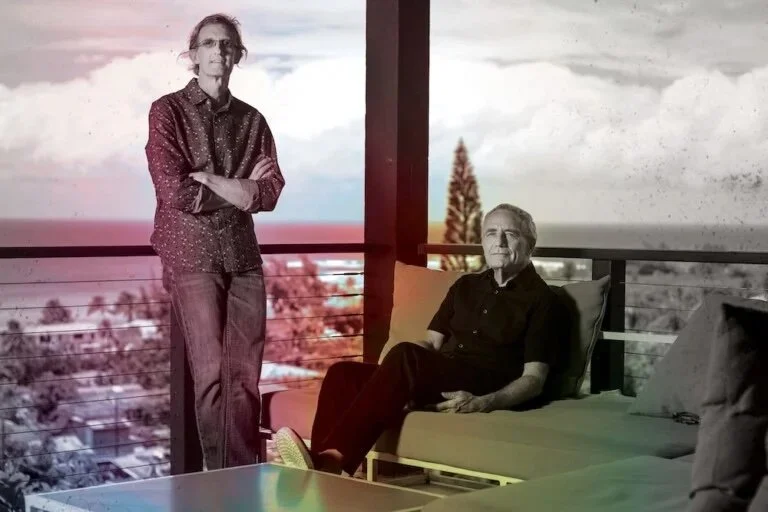The Quest for a Permanent AIDS Memorial and Site of Memory
For Pride 2025, Hawaii Business Magazine reached out to people active in the local LGBTQ community, or those in positions to advocate effectively, to express what Pride means to them today, in their own words.
The essays capture their joy, sorrow, worry and determination to maintain a vibrant community where everyone is valued. Because the reality is that basic rights are being steadily chipped away by executive orders, many targeting transgender people.
The Quest for a Permanent AIDS Memorial and Site of Memory
By Dean Hamer and Joe Wilson, Lei Pua ‘Ala Queer Histories of Hawai‘i
When we launched a new nonprofit project called Lei Pua ‘Ala Queer Histories of Hawai‘i in 2023, we were excited about creating new ways to bring Hawai‘i’s long history of gender and sexual diversity to a wide public audience.
From the early kānaka embrace of same-sex love and gender fluidity to the influences and experiences of missionaries, plantation workers and so many others who have come or were brought to these shores over the centuries, we knew that illuminating the little-known struggles and accomplishments of LGBTQ+ Māhū people in the unique context of these islands could inspire those seeking better lives for themselves, and those still working for justice and equality in communities near and far.
We never could have imagined that just two years into such work, a new president and administration intent not just on marginalizing and scapegoating our diverse communities, but on erasing our very existence, would give the project an alarming new sense of urgency and importance.
Now at our weekly performances of “The Return of Kapaemahu” in Waikīkī, we feel obliged to explain that despite President Trump’s executive order claiming that there are only two genders, individuals of dual male and female spirit do, in fact, exist and have long been an important part of Hawaiian culture.
The attempt to erase the accomplishments of the 442nd Japanese American soldiers in World War II, along with the defunding of the National Endowment of the Humanities, including our valued collaborators at the Hawai‘i Council for Humanities, was further evidence that we can no longer trust our own federal government to acknowledge that diversity is an essential element of our nation and people.
Equally concerning has been the campaign of the new administration to destroy the public health programs and agencies responsible for infectious disease control and preventative medicine. The recent display of the Hawai‘i AIDS quilt panels at the Capitol Modern was a poignant reminder of the devastation that HIV/AIDS brought to Hawai‘i, but also of the resourcefulness of our local LGBTQ+ Māhū community and state Department of Health, which responded with one of the most effective awareness and prevention campaigns in the country.
Now, our national health and human services agency is headed by a person who denies even the most basic facts about AIDS – that it is caused by HIV, and that anti-HIV drugs can both prevent and treat the devastating effects of the virus.
As the intent of the new regime to erase every trace of queer history and existence has become clearer, the fragility of our work and progress at the Lei Pua ‘Ala Queer Histories of Hawai‘i project has emerged. Websites can be erased, exhibitions taken down, performances canceled, historical markers removed, funding threatened, and other acts of censorship and intimidation unleashed.
How can we respond? While there are many possible answers to that question, one theme that has emerged from our conversations with a range of LGBTQ+ Māhū community members, students, kūpuna, people living with HIV/AIDS and others is the desire to create a permanent, visible and public reminder of our existence, and the challenges encountered and accomplishments made.
Thus was born the idea of a new AIDS Memorial and Community Memory Site for Hawai‘i – a place where people can gather to mourn those who have been lost or suffered from HIV/AIDS and other forms of oppression and erasure, honor Hawaiian traditions of diversity and inclusion, and celebrate those who have struggled and are continuing to pave the way toward a more just and equitable future for all.
We are fortunate to have two strong collaborators for this community-centered effort. One is the Hawai‘i Health & Harm Reduction Center, the first and largest AIDS service organization in the Pacific and a leader in public health and fighting stigma and discrimination. The other is the City and County of Honolulu, which has worked closely with us on a variety of projects to illuminate the people, places and events that make our city a shining example of why diversity, equity and inclusion is good for all. The city’s Rainbow Employee Resource Group, UH’s John A. Burns School of Medicine Student Pride Alliance, the Hawai‘i LGBT Legacy Foundation and other community groups are also involved.
The proposed site for the monument is the overlook at Kaka‘ako Waterfront Park, a magical place with encompassing views, ready public access, a history of association with the infectious disease epidemics that have devastated Hawai‘i over time, and a deep sense of spirituality.
While there are many steps ahead, our goal is to create a place where all our diverse communities can meet, reflect and rejuvenate; a place where our stories are literally written in stone – too large, visible and important to be ignored or erased.
Without Trump, such a memorial might or might not have come to fruition. With him in power, it must. We hope all those who value equality and justice will join us.
Dean Hamer and Joe Wilson are co-founders and co-directors of the nonprofit Lei Pua ‘Ala Queer Histories of Hawai‘i; co-directors with Hinaleimoana Wong-Kalu of the Oscar short-listed animated film “Kapaemahu”; and Emmy-winning documentary filmmakers. For more information, see queerhistoriesofhawaii.org.


